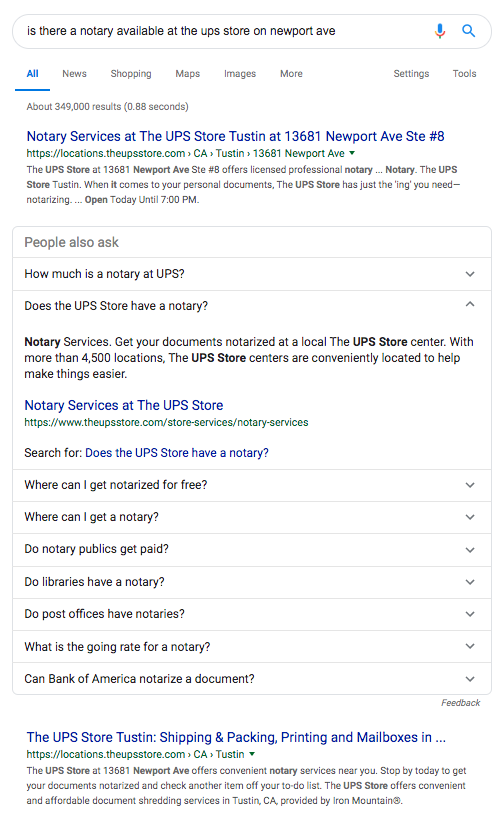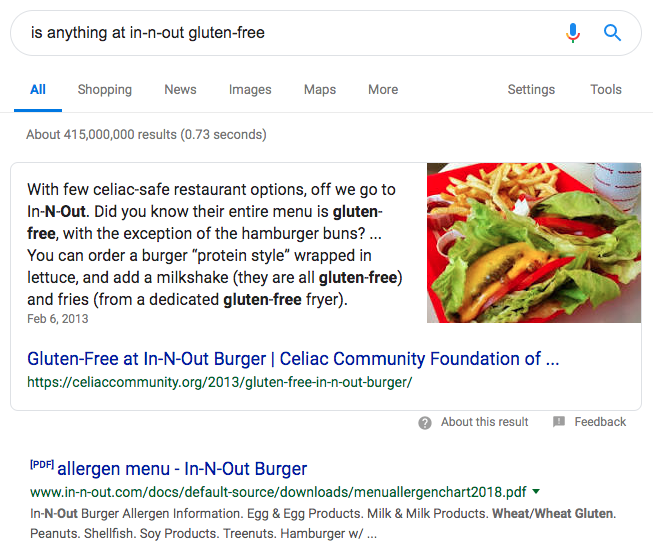State of Search
What Are Brand Verified Answers?
There’s a massive paradigm shift going on in the world of search from chaotic results to verified answers. Today, when consumers enter a search query, they are likely to find their answer directly on the search engine results page (SERP) — in a featured snippet, Knowledge Panel, local pack, or other SERP feature. These structured […]

There's a massive paradigm shift going on in the world of search from chaotic results to verified answers. Today, when consumers enter a search query, they are likely to find their answer directly on the search engine results page (SERP) — in a featured snippet, Knowledge Panel, local pack, or other SERP feature. These structured results are considered brand-verified answers when the featured information is provided, and confirmed to be accurate, by the brand itself.
Here's how it works: Try searching for "Is there a notary available at the UPS Store on Newport Ave?" The answer appears directly in the search results — in excerpts from The UPS Store's local pages for both Tustin, CA, and the Newport Ave store. In Google's "People Also Ask" section, we also see the answer as it appears on The UPS Store's national site. Because we can see that each of these results is sourced from TheUPSStore.com, we know they are brand-verified answers.

Now let's look at a different example: "Is anything at In-N-Out gluten-free?" As of this writing, a rich snippet on the SERP claims that the whole menu is gluten-free except for the buns — the catch is that this snippet is from a post published in 2013 on a website dedicated to celiac's disease. We got an answer, but it's not from the brand itself — is it accurate and up to date?

Further down the SERP, there's a link to a 2018 PDF from In-N-Out itself that provides additional detail, but gluten-sensitive searchers may never get there due to the answer in that snippet up top — and PDFs can be cumbersome on mobile devices, where customers are likely to be looking for information in high-intent moments.
With Google alone processing billions of queries each day, what consumers see in search results can have a significant impact on a business's bottom line.
Why Brand Verified Answers Matter
People are seeking accurate information online. And as queries grow longer, more complex, and more conversational, people expect specific and relevant answers to their detailed questions about companies, products, professionals, locations, and services.
But in an era of too much information — much of it wrong — reputations are at stake in search results. To give just one example, imagine that a lactose-intolerant customer searches online for an alternative yogurt brand's nutritional information. They aren't always likely to click through to a webpage, and instead they may rely on the featured snippet that pops up. The answer they find determines whether or not they purchase that product. If the answer was incorrect, at best they're frustrated — and at worst their health is at risk.
Brands that effectively manage and structure their data are better able to deliver accurate answers in search. Providing brand-verified answers helps brands provide perfect information, delivering their truth everywhere customers may be searching. That leads to a better and more trustworthy customer experience — and ultimately drives revenue, retention, and loyalty.
Learn how Yext can help your business deliverbrand-verified answersin search results.
